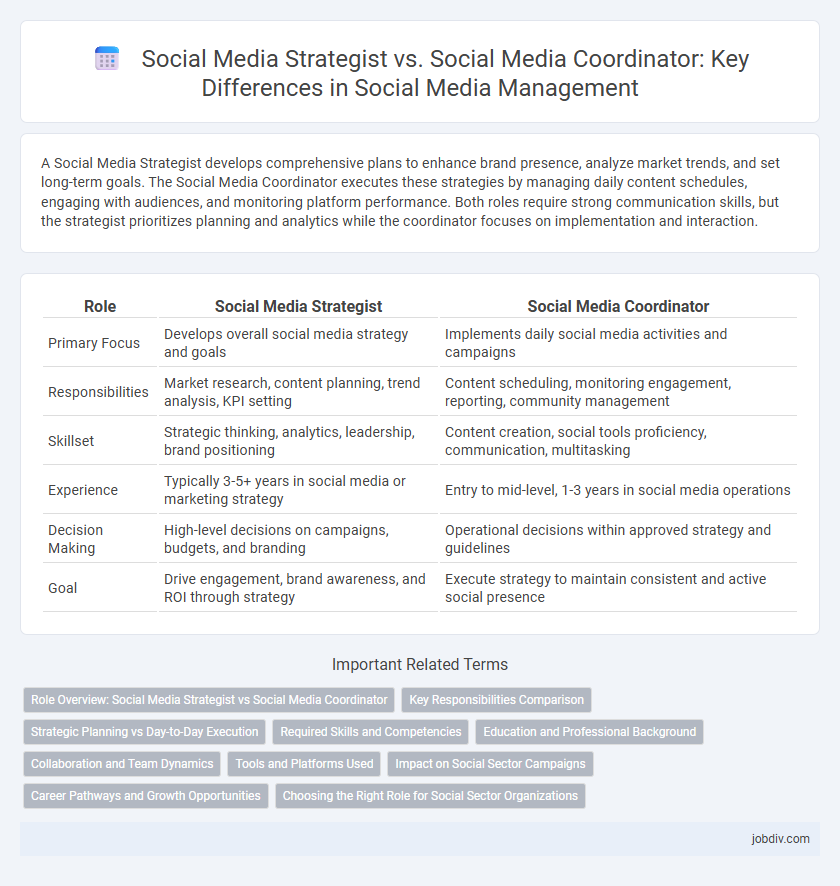A Social Media Strategist develops comprehensive plans to enhance brand presence, analyze market trends, and set long-term goals. The Social Media Coordinator executes these strategies by managing daily content schedules, engaging with audiences, and monitoring platform performance. Both roles require strong communication skills, but the strategist prioritizes planning and analytics while the coordinator focuses on implementation and interaction.
Table of Comparison
| Role | Social Media Strategist | Social Media Coordinator |
|---|---|---|
| Primary Focus | Develops overall social media strategy and goals | Implements daily social media activities and campaigns |
| Responsibilities | Market research, content planning, trend analysis, KPI setting | Content scheduling, monitoring engagement, reporting, community management |
| Skillset | Strategic thinking, analytics, leadership, brand positioning | Content creation, social tools proficiency, communication, multitasking |
| Experience | Typically 3-5+ years in social media or marketing strategy | Entry to mid-level, 1-3 years in social media operations |
| Decision Making | High-level decisions on campaigns, budgets, and branding | Operational decisions within approved strategy and guidelines |
| Goal | Drive engagement, brand awareness, and ROI through strategy | Execute strategy to maintain consistent and active social presence |
Role Overview: Social Media Strategist vs Social Media Coordinator
A Social Media Strategist develops comprehensive plans to enhance brand presence and achieve long-term engagement goals by analyzing market trends and audience behavior. A Social Media Coordinator handles the execution of these strategies through content creation, scheduling, and community management on various platforms. While the strategist focuses on high-level planning and performance metrics, the coordinator ensures timely implementation and maintains day-to-day social interactions.
Key Responsibilities Comparison
A Social Media Strategist develops comprehensive marketing plans, analyzes audience insights, and sets long-term goals to enhance brand visibility and engagement. A Social Media Coordinator executes daily content scheduling, monitors social interactions, and manages community responses to maintain consistent online presence. Both roles require collaboration with marketing teams, but strategists focus on big-picture growth while coordinators handle tactical implementation.
Strategic Planning vs Day-to-Day Execution
A Social Media Strategist focuses on strategic planning by analyzing market trends, defining target audiences, and creating long-term content calendars to achieve business goals. In contrast, a Social Media Coordinator handles day-to-day execution, including posting content, engaging with followers, and monitoring platform analytics. The strategist sets the vision and objectives while the coordinator ensures consistent implementation and responsiveness across social media channels.
Required Skills and Competencies
A Social Media Strategist requires advanced skills in data analysis, campaign planning, and audience segmentation to develop long-term brand growth strategies, while a Social Media Coordinator focuses on content creation, scheduling, and community engagement to execute daily social media activities. Proficiency in analytics tools like Google Analytics and Hootsuite is essential for strategists to track KPI performance, whereas coordinators excel in using content management systems and customer interaction platforms. Both roles demand strong communication, creativity, and adaptability, but strategists emphasize strategic thinking and market research competencies.
Education and Professional Background
A Social Media Strategist typically holds a bachelor's degree in marketing, communications, or a related field, complemented by extensive experience in digital marketing, brand strategy, and analytics. In contrast, a Social Media Coordinator often has an educational background in communications or journalism and develops hands-on skills managing social content, scheduling, and community engagement. Professional development for strategists involves advanced certifications in data analysis and strategic planning, while coordinators focus on content creation tools and social media platforms proficiency.
Collaboration and Team Dynamics
Social Media Strategists and Social Media Coordinators collaborate by aligning high-level campaign goals with daily content execution, fostering effective team dynamics through clear communication and role clarity. Strategists focus on overarching strategies and performance analytics, while Coordinators manage scheduling, community engagement, and real-time content adjustments, ensuring seamless workflow within social media teams. Strong collaboration between these roles enhances campaign coherence, agility, and overall brand presence across multiple platforms.
Tools and Platforms Used
Social Media Strategists primarily use advanced analytics platforms like Google Analytics, Hootsuite, and Sprout Social to develop data-driven campaigns and measure performance across multiple channels. Social Media Coordinators focus on content management tools such as Buffer, Canva, and native platform schedulers like Facebook Creator Studio to execute daily posting and engage with communities. Both roles frequently utilize platforms like Instagram, Twitter, LinkedIn, and TikTok, but strategists emphasize cross-platform strategy while coordinators prioritize consistency and timely content delivery.
Impact on Social Sector Campaigns
A Social Media Strategist shapes high-level campaign goals by analyzing audience insights and optimizing content distribution, driving deeper engagement for social sector initiatives. Social Media Coordinators execute these strategies through timely content creation and community management, ensuring consistent messaging and real-time audience interaction. Together, they enhance the impact of social campaigns by aligning strategic vision with operational execution, maximizing reach and fostering meaningful connections.
Career Pathways and Growth Opportunities
A Social Media Strategist typically leads campaign planning, analyzing performance metrics, and shaping brand voice, making it a senior role with strategic impact and higher salary potential. In contrast, a Social Media Coordinator handles daily content scheduling, community engagement, and reporting, serving as an entry point with foundational skill development. Career pathways often progress from Coordinator to Strategist, with growth opportunities expanding into digital marketing management or specialized roles like SEO and analytics.
Choosing the Right Role for Social Sector Organizations
Social media strategists develop comprehensive plans to elevate brand awareness and engagement across multiple platforms, using data analytics and trend insights tailored for social sector goals. Social media coordinators execute daily content management and community interactions to maintain consistent messaging and follower engagement. Choosing the right role depends on organizational needs: strategists drive long-term vision and measurable impact, while coordinators ensure effective implementation and real-time audience connection.
Social Media Strategist vs Social Media Coordinator Infographic

 jobdiv.com
jobdiv.com